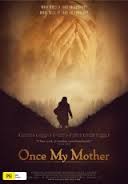
ONCE MY MOTHER
Australia, 2013, 96 minutes, Colour.
Directed by Sophia Turkewicz.
Once My Mother is a very moving documentary, a story of a daughter discovering the truth about her mother, a mother whom she had resented for a long part of her life.
Sophia Turkewicz made a name for herself as a film director in the 1970s and 1980s, especially with the perceptive film about Polish migrants to Australia, Silver City, which drew on her own experience and that of her mother. With this documentary, she makes a journey back into her past, back into the life of Helen, her mother, revealing quite an extraordinary story of a young Polish woman at the time of World War II.
The film opens with Sophia’s mother unable to care for herself and residing in a home for the elderly, with touches of dementia coming on. Sophia engages in conversation with her mother and takes her back into the past. What follows reveals, especially in her early years, hardships in life: work on a farm with relatives in Poland, leaving the farm at an early age and moving to the precarious existence in the city, being taken and transferred to a gulag, released after the war, going to the United Kingdom where she had choices as to where she might go. She chose to go to what is now Zambia, living in a tent camp for refugees, finally deciding to move to Australia, to Adelaide, where she had to work hard for a living, place her daughter to board in an orphanage (one of the main causes of the daughter-mother resentment), finally marrying and settling and living a long life.
It was in Lusaka that she met an Italian man, became pregnant, gave birth to Sophia, but the man was repatriated to Italy.
In 1977, Sophia began a film story about her mother, and Once My Mother uses footage of that period, a younger, vigorous Helen, talking to camera, gradually revealing aspects of her story, her experiences in the camp in Africa, the hard work in Adelaide and her regrets about her daughter boarding, her settling down.
But it was literally following in her mother’s footsteps that brought home to Sophia the difficult life that her mother had experienced. Sophia visits the farm in Poland, meet friends and hears about conditions at the time. An African visit. And, finally going to Italy, meeting her father who did not know about her, meeting his longtime wife and their children, her siblings, and experience of joy.
While the film is a memoir, a tribute to the difficult life of her mother, it is also a healing of memories for Sophia herself. The audience is invited in to share this life, learn something of a life that is so different from theirs, experience the regrets and resentments, experience the healing and reconciliation.
Audience will appreciate this story and its powerful and emotional feminine perspective.
1. A moving document? A moving story? A family narrative?
2. The director and her work, in film production, film direction? The story of herself, her mother, her mother’s past in Poland, the transfer to Africa, to Australia? An illegitimate daughter? Growing up, the camp, the orphanage, her mother’s visits, the resentments, her mother’s marriage and home, stepfather, her work and career, relationships, her children?
3. The attitude towards her mother, the title and tone? Sophia as young, feeling neglected, her angers, the years passing, the 1970s and her making a film about her mother, and filming her mother, talking with her, listening to the revelations? The audience seeing the clips? Her mother ageing, in the residence for the elderly, the visits, Sophia looking after her, the touch of senility? The importance of the visit to Poland, to Italy and finding her father and his family and some siblings? Pondering the differences – and what might have been?
4. Discovering the story of her mother, as a young girl, the farm, the family and leaving, at work in the city, and 15, picked up and sent to the gulag, the experiences there, the end of the war, sent to England, the decision to go to Africa, in Lusaka and the camp, her happiness there, the relationship with Sophie’s father, not able to acknowledge it, is returned to Italy and the lack of contact? The decision to go to Australia, finding a home, settling, the difficulties, hard work and placing Sophia in the orphanage, the visits? Her marriage, a settled life, her husband, family meals and glimpses, her ageing, her death?
5. The voice-over and the personal tone by the director?
6. The visuals, retracing her mother’s life, the visit to Poland, the visuals of the gulag, going to Africa, the visuals of the camp? The Italian images?
7. The audience and learning from this family narrative? The need for healing, the need for stories, the emergence of the truth, the relief of resentments, listening and speaking? the final healing?
8. The visuals of Sophia’s mother? The photos, the film, her ageing?
9. The visuals of Sophia, as young, with her mother, the orphanage, her career, the films, Silver City and the parallels with her mother’s life, Poland and Italy?
10. Audiences identifying with family quests and stories? Discoveries and healing?